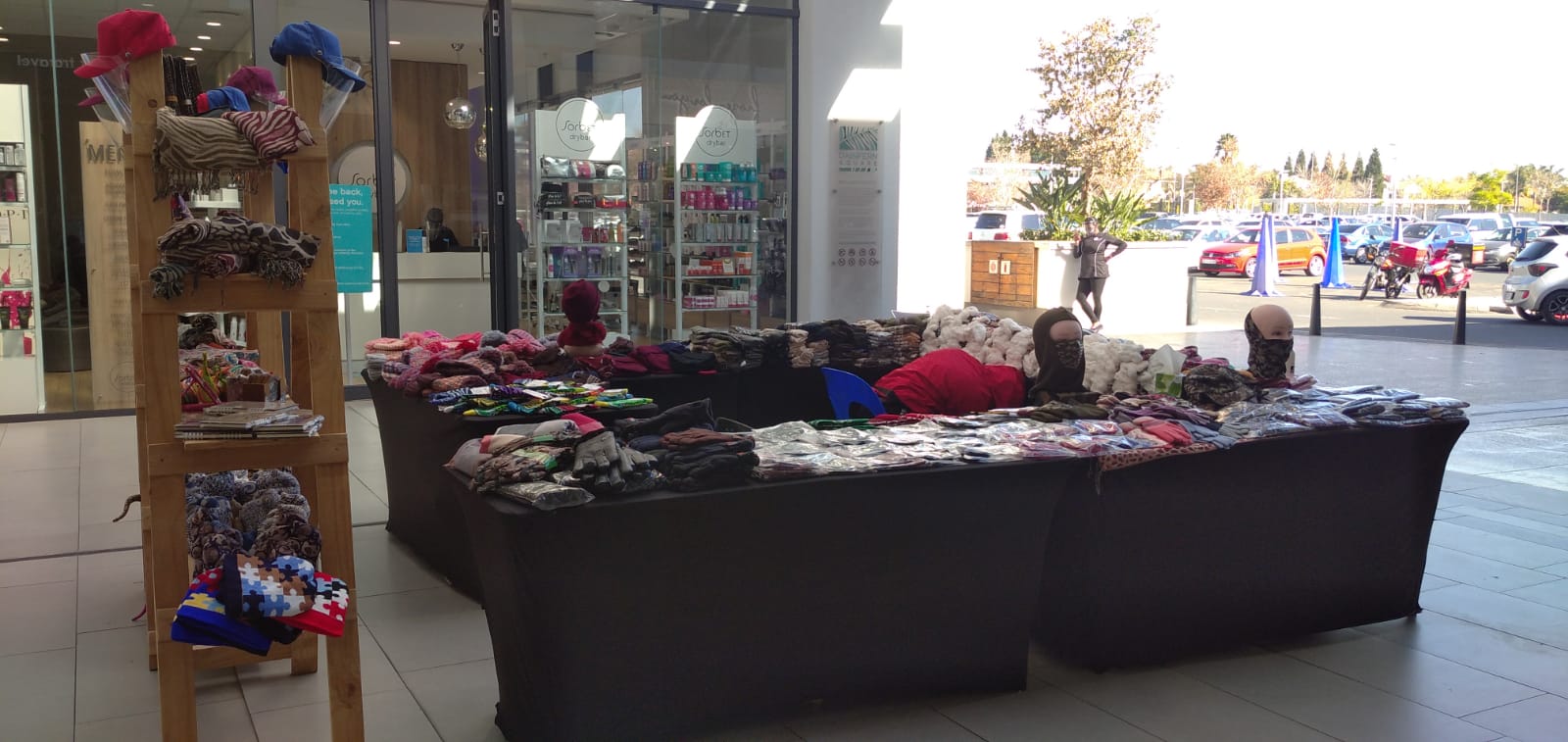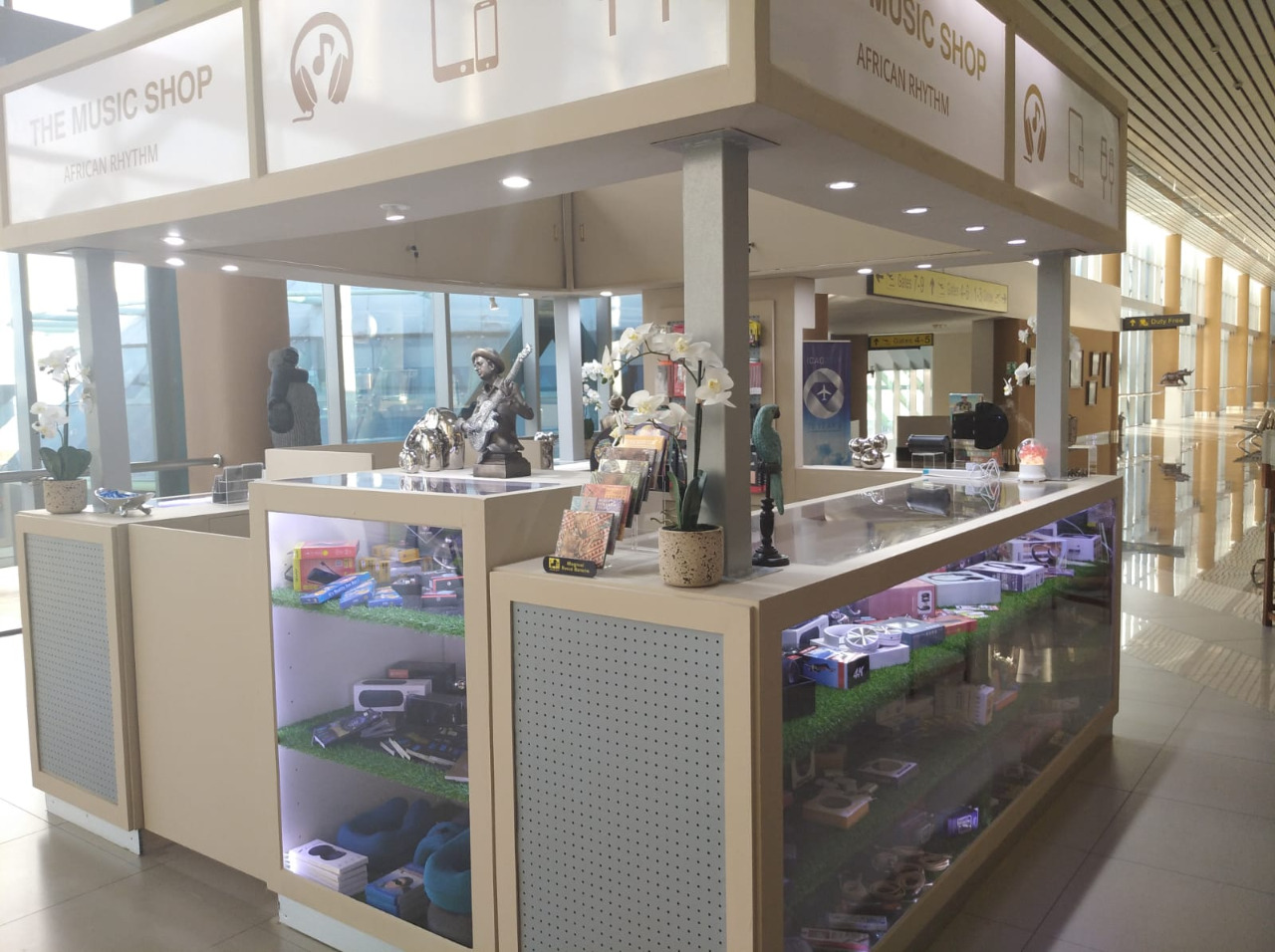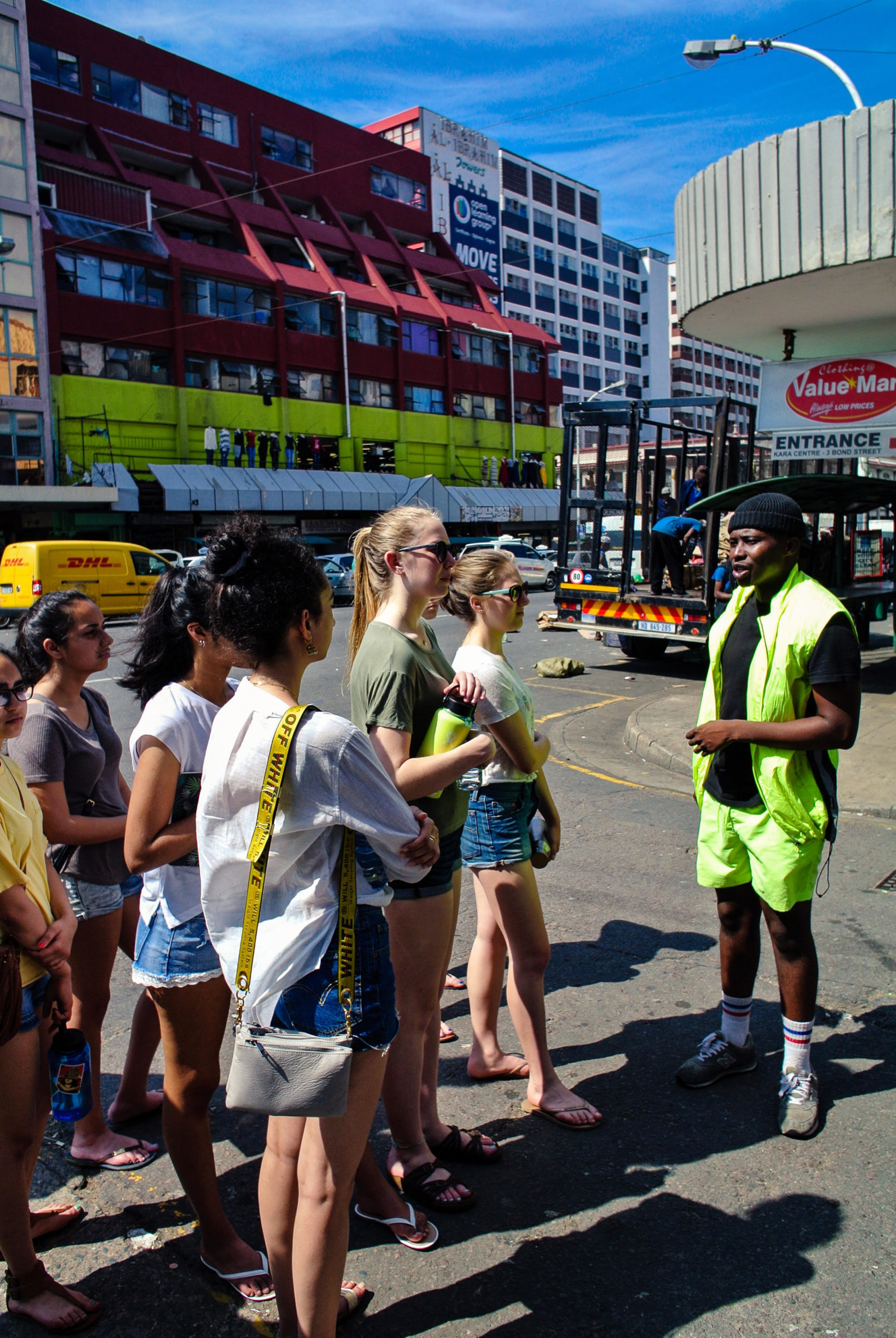Keeping the Hustle Alive
How young entrepreneurs are surviving the pandemic

The impact of the Covid-19 pandemic and the lockdown has been devastating for young entrepreneurs. But despite the harsh economic climate some are still hustling and finding innovative ways to keep their businesses alive. Daily Maverick spoke to a few of these young go-getters who are weathering the Covid storm, one deal at a time.
“This has been the most frightening and exhilarating time, to say the least. In all the business we’ve had to make extreme changes overnight from drastically cutting expenditure, navigating late payments from clients, reshuffling cancelled projects and sleepless nights on how we are going to get through the month, let alone the year,” said Lusanda Worsley, founder and managing director of Empire Experiential Marketing.
The 31-year-old, who is also the Managing Director for the SMC group in South Africa, was hit hard by the lockdown, but she and her team have found creative ways to keep the businesses alive during this bitter season.
The team started the SFG podcast (which stands for Swipe, F***, Ghost), initially as a way to maintain their sanity during Covid-19, but it blossomed into a successful project.
“At its core, the podcast is all about dating in the 21st century for the ‘young-ish’ black millennials from a queer, straight yet experimental and conservative point of view. We’ve featured guests like Moonchild Sanelly, Carrisa Cupido and are looking to bring more guests in like Dr.T and other intimacy professionals in the future,” said Worsley.
She was 25 when she had the idea to start her own creative agency and six years later she’s bagged clients like Lancôme, Hunters Extreme, Bisquit Coganc and Red Bull.

Lusanda Worsely (31) is the founder and managing director of Empire Experiential Marketing. When she was 25 she had the idea of starting her own agency and she hasn’t stopped since. (Photo: supplied)
Worsley has forged her own path and gained formidable success in a country where youth unemployment is sky-high. StatsSA found that between January and March 2020, over 43% of young people aged 15 to 34 were unemployed. The national narrow unemployment rate is sitting at a record 30.1% and the country was already in a recession before the hard lockdown.
The government isn’t doing enough to support young entrepreneurs
President Cyril Ramaphosa, during his State of the Nation Address 2020 speech in February, called youth unemployment a crisis and launched the Presidential Youth Employment Initiative, for which R19.6-billion has been allocated, and pledged grant funding to 1,000 young entrepreneurs over 100 days.
Anyone falling within the age group of 14 to 35 is considered “youth”.
DA Federal Youth leader Luyolo Mphithi, who also sits on the parliamentary committee for Women, Youth and Persons with Disabilities, feels the government is not doing enough to encourage and support young entrepreneurs.
“It is not enough to tell young people to start businesses and not provide any meaningful and sustainable support. Government needs to go further than telling young people to register businesses at the CIPC,” said Mphithi.
He said South Africa “sells” entrepreneurship as the panacea to youth unemployment, yet most businesses fail in the first six months due to lack of support and resources.
The World Bank 2020 Ease of Doing Businesss report ranked South Africa 84th, below other countries in sub-Saharan Africa such as Rwanda and Kenya.
In 2o19, the Department of Trade and Industry launched BizPortal, an online platform developed by the CIPC, to simplify the long and tedious process of registering a business in South Africa.
Entrepreneur and motivational speaker Nic Haralambous said entrepreneurship was the “only remedy” to the youth unemployment crisis in the country.
“Our country is not going to be fixed by big corporates. It’s going to be fixed by young entrepreneurs building businesses, up to 30, 40, 50 million rand in turnover, us having hundreds of those. If we don’t get that, there is no way we will break out of this economic recession.”
Casting aspersions on the NYDA
One government entity established to assist young people is the National Youth Development Agency (NYDA). It offers grants, skills training, mentorship and other programmes.
According to NYDA CEO Waseem Carrim, the agency was available online during the hard lockdown and reopened their doors under Level 3.
“The NYDA continued with its business development support services programme,” said Carrim. “We also continued to accept applications for the 1,000 businesses in 100 days campaign.”
So far the campaign has paid out R16,198,275 to 370 youth enterprises between 1 June and 17 July. The business development services have disbursed over R1-million to 136 businesses.
But Mphithi said the agency’s role in assisting young business owners is “questionable”.
“South Africa requires a coordinated approach to business support that is business-driven, not politically motivated, and staffed by people with personal business experience,” he said.
Questions have been raised about the selection process for the NYDA board, with suspicions that it is politically influenced.
During a Women, Youth and Persons with Disabilities parliamentary committee meeting, on 2 July, it was heard that the South African Youth Council had submitted a letter questioning the NYDA Board appointment process and the closed discussion on the criteria the committee had used to select its interview shortlist.
Thirty candidates were shortlisted with sub-par credentials: allegedly some had not completed their tertiary education, while others had minimal work experience.
The agency’s former chairperson is Sifiso Mtsweni. The term of the board ended in May 2020.
In April, the NYDA launched the Youth Micro Enterprises Relief Fund (YMERF) to aid youth-owned SMMEs which may not qualify for other funds. The grant was capped at R10,000 per recipient and, according to Carrim, R4,848,715.78 has been paid out to 768 enterprises.
The fund had a R6-million budget and received over 5,200 applications.
Mphithi was optimistic about the YMERF, saying it was a “step in the right direction” but was concerned that disbursements from the fund were slow.
Learning to hustle from a young age
Thirty-year-old Victor Githakwa didn’t bother applying for any grants after seeing complaints on social media regarding poor communication and non-payment of funds.
Githakwa runs three businesses: a kiosk selling electronics and accessories at Victoria Falls airport in Zimbabwe, an events directory called Party42nite and a pop-up store for winter accessories at Dainfern Square in Johannesburg.
His first venture, Party42nite was launched in 2014, while he was a university student. “We started an online platform that allows people to basically get direction of where to party.”
He launched his second business, at Victoria Falls Airport, after quitting his corporate job as a web developer. “I felt it wasn’t worth my potential and I knew obviously, starting a business, how to do that.”
The business has taken a knock due to the travel restrictions imposed to limit the spread of Covid-19. With reduced foot traffic at the Zimbabwean airport and the ban on gatherings in South Africa, Githakwa had to come up with a plan to “survive”.
He and his sister jumped onto the bandwagon, selling masks and sanitisers, but soon realised that the market was saturated. “It was quite a craze around that time,” he said. Though that business failed, they were not deterred and started Githakwa’s third enterprise, selling winter accessories at Dainfern Square.

After Covid-19 hit and his businesses took a knock, Victor Githakwa (30) and his sister started selling winter accessories at Dainfern Square in Johannesburg. (Photo: supplied)
The masks and sanitiser business, despite its lack of success, taught the young entrepreneur “how to do deals in bigger quantities” and grow his network.
For Githakwa, business runs through his veins. Born in Kenya, his family moved to South Africa when he was three years old where his father started selling jewellery and African art.
“We grew up in an entrepreneurial background where we had to do things for ourselves,” Githakwa told Daily Maverick. “My dad used to do some exhibitions so that’s how we learnt to make a quick buck.”

Victor Githakwa (30) launched his second business, a kiosk selling accessories and electronics at Victoria Falls Airport after quitting his corporate job as a web developer. (Photo: supplied)
Haralambous also showcased business savvy from a young age. He built his first business at 16 and now, after 20 years as a serial entrepreneur, has published a book on how to start a side hustle.
Haralambous said entrepreneurship needs to be taught from a young age, something South Africans are failing to do.
“It’s not a course at school. It’s not a course at university. Parents push their kids to do formal careers that are safe and secure, and what we’re discovering now is that those careers are not safe and secure.”
Githakwa echoed this sentiment. “Entrepreneurship needs to be taught from the very beginning where if you’re given R100 as a child, do you go buy sweets, or do you go buy sweets and sell them?”
So what is entrepreneurship
Haralambous has a contentious view on the definition of an entrepreneur. “For me an entrepreneur is someone who is going out to plug a specific hole, or a gap or to fix something that’s broken with a business or new solution that they take to market,” says Haralambous.
He differentiates between an entrepreneur and a business-owner who may buy and run a franchise but isn’t building “anything new”.
“The example is, if you open up a Steers, you aren’t building anything new, you’re opening an existing business. And then you run it.”
Two entrepreneurs who saw a hole in the market and decided to “plug it” are 26-year-old architect Mondli Cele and 29-year-old Influencer Marketing & PR specialist, Siki Msuseni.
Cele hasn’t officially launched his business but has been working on it for seven years. YAKHA AfriCAN Architecture is an online platform simplifying the procurement process of AfriCAN architectural, construction and furniture products.

YAKHA AfriCAN Architecture is an online platform simplifying the procurement process of African architectural, construction and furniture products. (Image: supplied)
“I realised Africa’s construction industry was outdated, Africa wasn’t contributing or collecting data to benefit and grow the industry and there was no online database of knowing what’s been built and the products that have been used in these projects.”
Though YAKHA, in its infancy, hasn’t been affected by the pandemic, it showed Cele some of the shortcomings in his industry.
“I’ve always stressed the importance of decentralised local manufacturing of architectural and construction products and furniture,” said Cele, who saw problems in the global supply chains.
“Building products and furniture are being held up in shipping containers at harbours. We hope the industry will learn from this crisis to think differently and start being aware of the products we have within the continent by using the YAKHA platform to specify African products for their next project,” he said, promoting his venture.
Born and raised in KwaZulu-Natal “by a teacher and minibus taxi owner”, Cele says his entrepreneurial background includes hosting inner-city architectural walks, cycles and dinners on weekends via Curiocity and Airbnb and serving as an art director and investor of an art and music festival in Bangkok.”

Mondli Cele, founder of YAKHA AfriCAN Architecture says he started his entreprenurship journey by hosting architectural walks and cycles on weekends via Airbnb. (Photo: supplied)
Msuseni says her business Amplified PR is not a “typical PR agency”. “We build favourable reputations for lifestyle brands. More than building these reputations we contribute to the Pan-African narrative by telling true African stories.” The agency provides numerous services within digital marketing and PR and teaches young girls digital skills to become employable.
She started the company after facing barriers to work flexibility, upward mobility and salary advancement at her previous job.
“The day I found out how much I generate for the business and how much I took home at the end of the month (my monthly salary) that was the day I started my exit strategy of starting my own agency.”
She now works with a hybrid team of freelancers for clients like social media influencer Mpoomy Ledwaba and Groomed by Earth.
The pandemic hasn’t affected her business negatively, she says; instead, it has given her a chance to strategise how to grow her company. But she has faced difficulties with clients restricting their budgets.

Siki Msuseni (29) is the founder of Amplified PR, a boutique PR agency servicing lifestyle clients. She describes herself as a ‘creative entrepreneur’. (Photo: Tsoku Maela)
There are opportunities even in a pandemic
Haralambous says this could be a fantastic time for young entrepreneurs to “fill a hole” in the market caused by Covid-19. Things like office cleaning and sanitising services.“Who is going to want to sanitise an office once a week? There’s a business opportunity.”
“Transport and travel are going to change dramatically, taxis are gonna have to keep the windows open. How do you protect people from the cold while protecting them from the virus?”
Identifying the day-to-day problems you face and finding a way to solve them is the first step to becoming an entrepreneur, said Haralambous.
For Msuseni, the upside of Covid-19 is that it’s revealed the importance of “digital” and generating multiple income streams.
Some tips on keeping the hustle alive through Covid-19
Haralambous gave some advice on how youth-owned businesses can bounce back after being forced to close their doors or start a new venture:
- Do not pivot aggressively away from the things that you know you are good at. Even if right now the pandemic is shutting down, the world will open up again.
- Start small: be patient and over time you will go from R500 a month in sales to R1,000 to R10,000
Get over your fear of failure: That is statistically how it goes. Majority of businesses fail within the first 18 months. “So be it, get over it and build another one. One of them will eventually hit.” DM


















 Become an Insider
Become an Insider